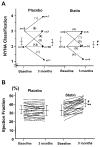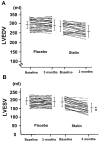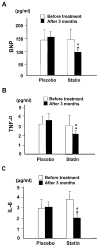Short-term statin therapy improves cardiac function and symptoms in patients with idiopathic dilated cardiomyopathy
- PMID: 12885745
- PMCID: PMC2665260
- DOI: 10.1161/01.CIR.0000084539.58092.DE
Short-term statin therapy improves cardiac function and symptoms in patients with idiopathic dilated cardiomyopathy
Erratum in
- Circulation. 2003 Oct 28;108(17):2170
Abstract
Background: Chronic heart failure is associated with inflammation and neurohormonal imbalance. The 3-hydroxy-3-methylglutaryl-CoA (HMG-CoA) reductase inhibitors, or statins, exert anti-inflammatory and vascular protective effects. We hypothesized that short-term statin therapy may have beneficial effects in patients with nonischemic heart failure.
Methods and results: Sixty-three patients with symptomatic, nonischemic, dilated cardiomyopathy were randomly divided into 2 groups. One group received simvastatin (n=24), and the other group received placebo (n=27). The initial dose of simvastatin was 5 mg/d, which was increased to 10 mg/d after 4 weeks. After 14 weeks, patients receiving simvastatin exhibited a modest reduction in serum cholesterol level compared with patients receiving placebo (130+/-13 versus 148+/-18, P<0.05). Patients treated with simvastatin had a lower New York Heart Association functional class compared with patients receiving placebo (2.04+/-0.06 versus 2.32+/-0.05, P<0.01). This corresponded to improved left ventricular ejection fraction in the simvastatin group (34+/-3 to 41+/-4%, P<0.05) but not in the placebo group. Furthermore, plasma concentrations of tumor necrosis factor-alpha, interleukin-6, and brain natriuretic peptide were significantly lower in the simvastatin group compared with the placebo group.
Conclusions: Short-term statin therapy improves cardiac function, neurohormonal imbalance, and symptoms associated with idiopathic dilated cardiomyopathy. These findings suggest that statins may have therapeutic benefits in patients with heart failure irrespective of serum cholesterol levels or atherosclerotic heart disease.
Figures




Comment in
-
Short-term statin therapy and cardiac function and symptoms in patients with idiopathic dilated cardiomyopathy.Circulation. 2004 Feb 10;109(5):e34; author reply e34. doi: 10.1161/01.CIR.0000115211.60667.A6. Circulation. 2004. PMID: 14769695 No abstract available.
Similar articles
-
Ivabradine in Children With Dilated Cardiomyopathy and Symptomatic Chronic Heart Failure.J Am Coll Cardiol. 2017 Sep 5;70(10):1262-1272. doi: 10.1016/j.jacc.2017.07.725. J Am Coll Cardiol. 2017. PMID: 28859790 Clinical Trial.
-
Beneficial effects of statins in patients with non-ischemic heart failure.Z Kardiol. 2004 Feb;93(2):103-8. doi: 10.1007/s00392-004-1005-0. Z Kardiol. 2004. PMID: 14963675 Clinical Trial.
-
Neutral effect on markers of heart failure, inflammation, endothelial activation and function, and vagal tone after high-dose HMG-CoA reductase inhibition in non-diabetic patients with non-ischemic cardiomyopathy and average low-density lipoprotein level.J Am Coll Cardiol. 2006 Jan 17;47(2):338-41. doi: 10.1016/j.jacc.2005.06.087. Epub 2005 Dec 20. J Am Coll Cardiol. 2006. PMID: 16412857 Clinical Trial.
-
Statin therapy improves long-term survival in non-ischaemic cardiomyopathy: a pooled analysis of 4500 patients.Heart Lung Circ. 2014 Oct;23(10):985-7. doi: 10.1016/j.hlc.2014.04.007. Epub 2014 Apr 18. Heart Lung Circ. 2014. PMID: 24851827 Review.
-
Pharmacodynamics and pharmacokinetics of the HMG-CoA reductase inhibitors. Similarities and differences.Clin Pharmacokinet. 1997 May;32(5):403-25. doi: 10.2165/00003088-199732050-00005. Clin Pharmacokinet. 1997. PMID: 9160173 Review.
Cited by
-
Statin therapy decreases N-terminal pro-B-type natriuretic peptide in HIV: randomized placebo-controlled trial.AIDS. 2015 Jan 28;29(3):313-21. doi: 10.1097/QAD.0000000000000547. AIDS. 2015. PMID: 25686680 Free PMC article. Clinical Trial.
-
Remote ischaemic preconditioning does not alter perioperative cytokine production in high-risk cardiac surgery.Heart Asia. 2012 Aug 13;4(1):97-101. doi: 10.1136/heartasia-2012-010122. eCollection 2012. Heart Asia. 2012. PMID: 27326040 Free PMC article.
-
Statins and Cardiomyocyte Metabolism, Friend or Foe?J Cardiovasc Dev Dis. 2023 Oct 2;10(10):417. doi: 10.3390/jcdd10100417. J Cardiovasc Dev Dis. 2023. PMID: 37887864 Free PMC article. Review.
-
No benefits of statins for sudden cardiac death prevention in patients with heart failure and reduced ejection fraction: A meta-analysis of randomized controlled trials.PLoS One. 2017 Feb 6;12(2):e0171168. doi: 10.1371/journal.pone.0171168. eCollection 2017. PLoS One. 2017. PMID: 28166237 Free PMC article.
-
Statin therapy for cardiac hypertrophy and heart failure.J Investig Med. 2004 May;52(4):248-53. doi: 10.1136/jim-52-04-33. J Investig Med. 2004. PMID: 15521546 Free PMC article. Review.
References
-
- Braunwald E, Bristow MR. Congestive heart failure: fifty years of progress. Circulation. 2000;102:14–23. - PubMed
-
- Torre-Amione G. The syndrome of heart failure: emerging concepts in the understanding of its pathogenesis and treatment. Curr Opin Cardiol. 1999;14:193–195. - PubMed
-
- Packer M. Neurohormonal interactions and adaptations in congestive heart failure. Circulation. 1988;77:721–730. - PubMed
-
- Drexler H, Hornig B. Importance of endothelial function in chronic heart failure. J Cardiovasc Pharmacol. 1996;27:S9–S12. - PubMed
-
- Treasure CB, Klein JL, Weintraub WS, et al. Beneficial effects of cholesterol-lowering therapy on the coronary endothelium in patients with coronary artery disease. N Engl J Med. 1995;332:481–487. - PubMed
Publication types
MeSH terms
Substances
Grants and funding
LinkOut - more resources
Full Text Sources
Other Literature Sources
Medical

